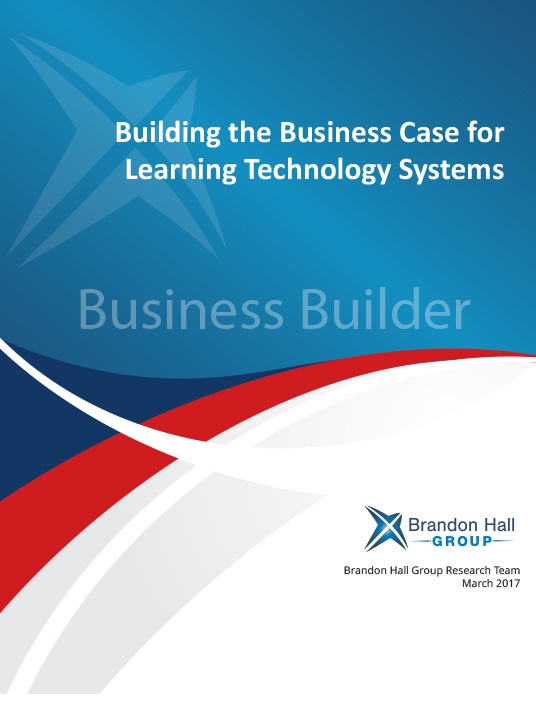Vital Aspects To Pay Attention To When Building A Business Case For Learning Technology Systems
Organizations today are facing extreme changes in the learning requirements of their workforces. Particularly, the influx of Millennials into the workforce has clearly shifted the way organizations need to create and deploy their learning. These new sets of learning requirements are forcing companies to rethink their learning strategies. World-class organizations are responding to the challenge by rethinking their learning technology selections. Docebo, in response to all those rapid workforce changes, created the free eBook Building The Business Case For Learning Technology Systems to present a guided approach on how to demonstrate to your executives how valuable an LMS investment can prove to be.

The goal of this article is to assist organizations in thinking through the technological decisions and business case for the right learning technologies. The report will focus on why companies need to rethink their learning technology decisions. It will also highlight what type of learning management system is required to meet the rapidly evolving needs of the learning audience.
1. Business Impact
Based on Brandon Hall Group’s research [1], 92% of companies are using LMS technology to support a blended learning approach. Organizations investing in these systems have experienced considerable impact on their business objectives. 54% of companies have seen productivity and engagement improve since implementing a learning technology system. 91% of companies report a stronger link between learning and organizational performance. According to the same research, companies are integrating learning technology with other systems, such as HRIS (37%), Content Management (29%), Talent Management (28%) and Workforce Management (21%), ERP (50%) and CRM (45%).
2. Business Need
Learning and Development is becoming more challenging as the workforce continues to evolve into a multi-generational learning audience. Organizations are finding that their current learning technology strategies do not meet the learning requirements of their employees. Learning technology solutions must provide a stronger link between education and training and individual and organizational performance. The free eBook Building The Business Case For Learning Technology Systems by Docebo sheds light on the aforementioned issue.
Organizations are learning quickly that a learning strategy that is dominated by instructor-led training (ILT) is not a long-term strategy. More than three-quarters of organizations say that formal learning experiences like ILT are either important or critical to their business. Informal learning experiences are seen as just as important. However, 86% of companies say that experiential learning is equally important [1]. According to the same source, more than half say it is critical to their business.
In a world of multi-modal learners, organizations are quickly finding out that their LMS needs to be multi-faceted. Many companies are relying too heavily on legacy systems that do not provide the latest technological advances to support multi-generational learners. Learning and development within companies has reached a new level of sophistication and complexity. In order to address this challenge, organizations must adopt a new approach to learning and development. They must also focus on the leveraging of a Learning Management System.
In a world where 58% of companies are trimming their learning and development budget or leaving it the same, the demand for return on investment for learning is at an all-time high and so is the budget for learning technology [1]. With the right Learning Management System in place a company can dramatically improve its ability to attract multi-generational learners and deliver high impact education and training to a wide audience.
3. Solution
Docebo’s free eBook Building The Business Case For Learning Technology Systems demonstrates how next-generation learning management systems offer much more than a traditional learning management system. These systems offer advanced capabilities, including mobile, social, assessments, advanced reporting and analytics. They can also have a dramatic impact on the learner experience. Next-generation Learning Management Systems have evolved from rudimentary training platforms used to support compliance-based training to a complete array of features that serve both the administrator and the learner.
New Learning Management Systems offer the ability to support the entire blended learning strategy to include both formal and informal learning. These systems promote a learning experience that attracts learners though learning portals and peer to peer learning. They also include features such as gaming and simulation, mentoring capabilities and straightforward integration with other systems. Last but not least, they offer mobile capabilities, and the ability to support extended enterprise learning. More recently, these systems support Experience API (xApi/Tin Can) and several also include integrated talent management functionality.
The goal of these solutions is to provide full support for a blended learning strategy. That goes whether it is an instructor-led or self-paced eLearning course. Companies are looking for learning systems that incorporate multiple talent discipline technologies. Learning technology is a major focal point of consolidation where content development and deployment can be done on one system. This strategy reduces the need to manage multiple vendors and multiple point solutions. Advanced learning management systems provide end-to-end support of the learning experience.
By defining the business need, the impact and utilizing the suggested solution you will be able to provide your executives with a persuasive business case for learning technology systems. Docebo’s free eBook Building The Business Case For Learning Technology Systems is your ultimate guide towards convincing your executives about the value an LMS investment brings to the table.
References:
Related Articles:
- 8 Critical Questions To Consider When Building A Business Case For Learning Technology Systems
- Free eBook: Building The Business Case For Learning Technology Systems









